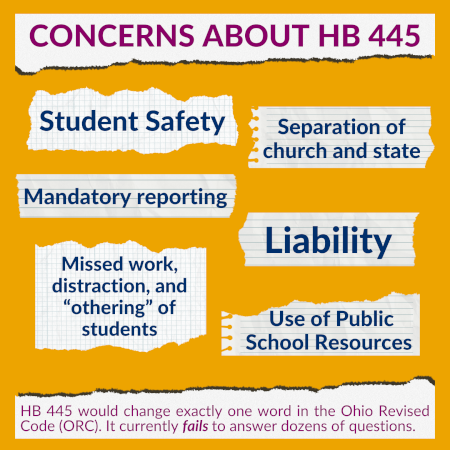Released Time Religious Instruction (RTRI) is where public school children are taken off school grounds to attend a religious class, under the guise of “character building”, during the school day. RTRI is constitutional and is allowed under Ohio law but we here at SHoWLE don’t support the effort and have put this page together to give you the information needed to make an informed decision. Parents need to do their due diligence before allowing any non-school entity to take your children out of school. Current law won’t protect your child.
In Ohio, RTRI is covered under Ohio Revised Code 3313.6022. The big takeaway is that school districts are now required to adopt an RTRI policy as for April 1, 2025.
Other points from the law:
(1) The student’s parent or guardian gives written consent.
(2) The sponsoring entity maintains attendance records and makes them available to the school district the student attends.
(3) Transportation to and from the place of instruction, including transportation for students with disabilities, is the complete responsibility of the sponsoring entity, parent, guardian, or student.
(4) The sponsoring entity makes provisions for and assumes liability for the student.
(5) No public funds are expended and no public school personnel are involved in providing the religious instruction.
(6) The student assumes responsibility for any missed schoolwork.
(7) Districts are allowed to request background checks of RTRI volunteers
(8) Districts must work with an RTRI entity to schedule a time for the class.
Beyond the points in the law, the RTRI policy can be whatever the district board decides such as limiting RTRI to lunch, recess, or to the end of the day. Policies could also dictate a Memo of Understanding that says the program would end if the entity didn’t meet certain requirements like getting students back on time and/or the RTRI program would have to provide lunch or pay for lunch if the class was at lunch time.
LifeWise Academy
The largest organization pushing to use RTRI in Ohio is Lifewise Academy founded by former football player Joel Penton. According to a January 2025 post on Ohio Capital Journal:
LifeWise Academy enrolls nearly 50,000 students across 29 states — including about 160 Ohio school districts.

Lifewise works with local volunteer groups to establish an academy in a district with the goal of reaching all the students and all district buildings. The local group raises the money to operate the academy and Lifewise claims it can cost up to $300 a student which would include paying teachers, location rental or mortgage, and transportation to and from the class. LifeWise provides operational support, curriculum, and liability insurance.
The LifeWise class teaches the Christian Bible only.
LifeWise Academy maintains a high view of the authority of Scripture and we align ourselves with historic, orthodox Christian beliefs as expressed in the Nicene Creed. We believe the storyline of Scripture that climaxes in the central gospel message, that Jesus Christ died for our sins and was raised from the dead. We believe this gospel is true and essential and announces the way by which sinners are reconciled to God.
Lifewise doesn’t allow parents or school districts to freely examine the curriculum , so some assume, falsely, based on statements from Lifewise, that they only teach some non-denominational generic form of Christianity. One lesson we were able to see tries to teach Human sacrifice is okay as long as God approves.
There are also some Christian ministers and leaders of other sects who don’t approve of the version of Theology Lifewise teaches.
The curriculum and operation of Lifewise directly conflicts with the goal of public schools to be inclusive. The class has nothing to do with any core curriculum of a public school district and it has nothing to do even tangentially with anything taught in the schools. LifeWise is simply a weekday Sunday school and is not inclusive of any other religious beliefs.
A small number of parents believe that for children to grow into productive individuals they need religious instruction and it must be done either in school or part of the school day. Many of these same parents believe sports or other extracurricular activities are more important than their religion and that’s why they love the Lifewise model of class during the day so little Timmy or Lucy don’t miss their travel soccer or softball games on the weekends.
All parents should have a right to direct the religious education of their children, but if they want their child to attend Sunday school during the week then they should send their children to a religious based school not a public school.
And what about the children who don’t attend because they aren’t Christian or the correct kind of Christianity or the parents simply object? Kids today struggle with peer pressure and bullying and there have been reports the kids that attend LifeWise will bully or make fun of the kids who don’t attend including telling them they will go to hell.

LifeWise claims they are teaching character values. Teaching kids character values or morality can be done without using religion. The Golden Rule is one of the oldest values in human history — even older than what we know as Christianity. The goal of LifeWise is to indoctrinate and convert vulnerable children into Christianity. Is that something we really want to happen? Can you imagine if a Muslim academy tried to get started?
LifeWise isn’t the only attempt to insert religion back into public schools. Joel Penton, the founder of LifeWise, is a motivational speaker who sets up public school assemblies under the guise of “character building” and then during the assembly — which isn’t voluntary — he entices the kids to attend a church service outside of the school day at a nearby church or sometimes where the school assembly took place.
LifeWise is connected to several groups that helped write the Project 2025 book that conservatives are using during the current presidential administration. Lifewise was a sponsor of a recent Moms for Liberty national convention. LifeWise has received grants of approximately $4 million dollars from some groups that fund and support known hate groups. It has been featured on the media channels of several known hate groups like Focus on the Family. LifeWise was able to purchase a new headquarters building for cash, yet they require local groups to raise thousands of dollars to establish a LifeWise program in their district.
According to a January 2025 article by the Columbus Dispatch, Lifewise netted a profit of over $17.2 million in its most recent IRS filing, up from $4.3 million the year before.
An August 2025 report on NBC4 in Columbus noted:
IRS filings show the rapid growth of LifeWise. In 2019, it claimed just more than $1.6 million in revenue. That number ballooned to more than $35 million in 2024.
That money comes mostly from donations, program fees, and grants, although LifeWise did claim almost $900,000 in investment income in 2024. Many contributions are made through foundations categorized as Donor Advised Funds, or DAFs. These types of foundations allow donors to anonymously contribute money to the fund and direct it to an organization of their choosing.
“Our programs typically pay about 9% in administrative fees,” [Penton] said. “As of right now, that does not even come close to covering what it costs the central what we call our support center, to serve our communities. We do a lot of central fundraising to make up the difference. But we’re on a plan that at scale, it will be sustainable.”
So Lifewise charges fees to local groups, requires them to fundraise $30,000 to $40,000 to pay teachers and other items, yet the headquarters is sitting on $35 million. LifeWise comes across as a religious non-profit but they seem to be generating a profit on the backs of local groups.
According to the IRS filing, Steve Clifton, LifeWise chief operating officer and chief financial officer, was the highest-paid employee in the organization, receiving $125,932 last year with an additional $57,600 in other reportable compensation. Derek Stemen, vice president of advancement, was paid $113,381.
Jefferey Peterson, vice president of operations, and Kurt Snedecor, director of strategic partnerships, both received salaries of more than $100,000, according to the filings.
Joel Penton, CEO and founder of LifeWise, received a salary of $51,824, but also received additional compensation of $60,000.
Why You Should Be Concerned
- LifeWise refuses to freely divulge anything about their company such as the specific curriculum used keeping parents from making an informed decision. They will share selected segments of their curriculum but only after you provide a lot of personal information and no reason is given for needing your address and phone number for example.
- LifeWise claims they do background checks on everyone involved. Since the people who work with LifeWise aren’t school employees the districts ARE NOT doing background checks. The background checks are like credit reports and are nothing like checks done for public school teachers. If a person is not allowed be a school district employee then then they should not be allowed to volunteer with LifeWise.
- LifeWise does not verify the “signatures” on the district interest forms on their website. Someone not living in a particular district can “sign” the interest form for that district. It is known that in some cases churches outside of a district had members sign forms. LifeWise also cites a study that shows their program improves school attendance and student behaviors without disclosing the “study” was paid for by LifeWise, isn’t scientific, and doesn’t show what they claim it shows.
- No matter what the law says and how many waivers are signed, the school district will still be responsible should something happen to the children.
- LifeWise teaches only the Christian Bible and only their version of the Christian Bible excluding not only other faiths and no faith but also other Christian sects like Catholicism.
- Schools have a busy day of course work and testing. There is not time to basically stop all that so kids can go to bible school in the middle of the day. The beginning or end of the day is a better fit yet LifeWise refuses to consider operating at the beginning or end of the school day.
- LifeWise is not responsible for what happens to children who don’t participate — most are put in a study room to do busy work so that LifeWise kids don’t miss any new work.
- While LifeWise doesn’t openly proselytize in school they are known to give enrolled students candy and other prizes to take back and show the kids who didn’t participate how great the class was and how much fun they had to use peer pressure to get more kids to attend. This is unethical to say the least. There is also the issue bullying.
- There have been reports from districts that have LifeWise that in violation of state law, administrators and teachers have been recruiting students to attend the class. One local district promoted LifeWise for over a year in the district wide email newsletter. The law is clear that no tax funds can be spent and no district personnel can be used for LifeWise and if they aren’t allowed to setup a table at the school they they shouldn’t be allowed to appear in the district communications to parents.
- Once RTRI is approved in a district, it is open to ANY 3rd party that meets the thin requirements in state law. Any group with the money to setup the infrastructure for a “class” can set up shop and enroll students. The district has no oversight beyond taking attendance.
What can you do to help?
Communicate with your school board if any RTRI enity is trying to establish itself in your district. Share the information in this FAQ and let the Board know they can adopt RTRI policy that is stronger than state law adding to it to address the major concerns noted here. It is important to note that school boards can’t approve or deny specific programs only the policy that allows children to be excused to attend.
Communicate with parents. There can be results if you group together with other parents who are opposed to LifeWise and you let the district know about your opposition. Supporters of Lifewise claim “everyone wants it” but in reality few people actually want it in their district and it is usually the religious zealots who like to ban books etc.…
If it is approved, make sure LifeWise follows the law and that no district employees promote or provide resources to LifeWise. If you find violations , let your school board know about it and make these violations public.
If you are highly motivated, try to establish an alternative character building program not based on religion or the Bible. But if you plan to offer an alternative make sure you are ready to actually do it just like a LifeWise group — have a location, instructors, liability insurance and follow the Ohio revised code. If you offer it and don’t actually plan to do it you will be taken less seriously by a school board.
Do a records request from the school district to see what the attendance numbers are and how many permission slips have been turned in. You can also request any emails or correspondence between the school district and LifeWise and the local group. School districts are required to provide records if requested.
If you need help creating a Public Records Request, check out this document with a template you can use from Reclaiming Their Time.
If you believe there have been violations of the law and ethics you can contact one of the religious freedom groups for help. Americans United for the Separation of Church and State and the Freedom from Religion Foundation are good places to start.
You can follow this issue through the group Secular Education Association (formerly Parents AGAINST Lifewise). They have a website, Facebook group, and material you can share with other parents. The group is also looking for parents and current public school teachers who will go on record about their personal experiences with LifeWise. There is a need to collect actual evidence of violations of the law.
You can also follow this issue through the Honesty in Ohio Education website. They released a tool-kit with details about what to do if Lifewise is in your district or coming to your district.
Honesty for Ohio Education RTRI Tool-kit (updated since the change in the law)
Lifewise was able to get some friends in the Ohio Legislature to propose forcing school districts to adopt an RTRI policy and therefore allowing Lifewise to operate. HB 8 was signed into law but it did NOT fix any of the issues mentioned on this page.
In November 2023, Ohio Attorney General David Yost, at the suggestion of Lifewise founder Joel Penton, sent a letter to a local school board reaffirming that RTRI and Lifewise were legit in Ohio. However, even Yost acknowledged that Lifewise goes much further than the decision in Zorach v. Clauson allows:
If a school simply allows students to leave, according to parents’ wishes and without public funds, the school is honoring religious liberty, not violating any rules against establishing a state religion.
School districts only need ALLOW students to leave — they aren’t required to do anything else to help facilitate Lifewise no matter what state law dictates. If parents are okay with allowing a third party to remove their child from school with only a basic background check and take them walking or by bus to another location for bible class then a school district can’t stop them.
Instead of that basic function we have school districts that hold off teaching new material so that Lifewise students don’t miss out forcing non-attending kids to do busy work and not learning anything new. We also have districts being reimbursed by the state for lunches given to Lifewise students who eat them at class off campus against previous USDA rules.
For more information:
We’ve done a few podcast segments on Released Time Religious Instruction and LifeWise in particular you might want to check them out at Glass City Humanist.
Deception and Influence: A Close Look at LifeWise Academy (interview with founders of Parents Against LifeWise now Secular Education Association )
Release Time Religious Instruction Is Unethical
Breaking Down Societal Norms: Henry Rollins and Release Time Religious Education
Defending Church-State Separation: A Conversation with Andrew Seidel


